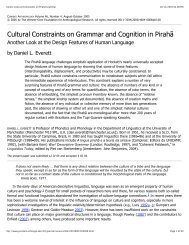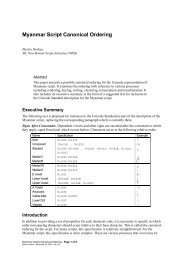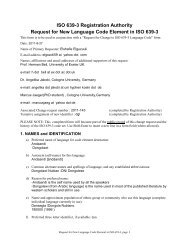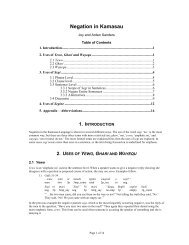- Page 1 and 2:
Instituto Lingüístico de Verano,
- Page 3 and 4:
Serie de gramáticas de lenguas ind
- Page 5 and 6:
Las fotografías del pueblo de San
- Page 7 and 8:
vi LA GRAMÁTICA MIXTECA PARTE 5: O
- Page 9 and 10:
El gran tronco otomangue El idioma
- Page 11 and 12:
Ñoo San Andrés Yutatío tá sa̱
- Page 13 and 14:
Abreviaturas y símbolos adj. adjet
- Page 15 and 16:
La agencia municipal de San Andrés
- Page 17 and 18:
El kinder
- Page 19 and 20:
4 GRAMÁTICA MIXTECA 1.2. Los mixte
- Page 21 and 22:
6 GRAMÁTICA MIXTECA kadi puede ser
- Page 23 and 24:
Sección del códice mixteco “8 v
- Page 25 and 26:
10 GRAMÁTICA MIXTECA e j m nd che
- Page 27 and 28:
12 GRAMÁTICA MIXTECA aa ta̱a homb
- Page 29 and 30:
14 GRAMÁTICA MIXTECA En algunas po
- Page 31 and 32:
16 GRAMÁTICA MIXTECA Cuando alguie
- Page 33 and 34:
18 GRAMÁTICA MIXTECA completa ñá
- Page 35 and 36:
20 GRAMÁTICA MIXTECA Además, much
- Page 37 and 38:
Paredes de un palacio de Mitla con
- Page 39 and 40:
24 GRAMÁTICA MIXTECA iin vee una c
- Page 41 and 42:
26 GRAMÁTICA MIXTECA ̱ ta̱yo̱ó
- Page 43 and 44:
28 GRAMÁTICA MIXTECA ta̱ndóó pr
- Page 45 and 46:
30 GRAMÁTICA MIXTECA 1. dini̱ yí
- Page 47 and 48:
32 GRAMÁTICA MIXTECA Ejemplo de un
- Page 49 and 50:
34 GRAMÁTICA MIXTECA ̱ ̱ Singula
- Page 51 and 52:
36 GRAMÁTICA MIXTECA 4.3. Adjetivo
- Page 53 and 54:
38 GRAMÁTICA MIXTECA de̱e kúú o
- Page 55 and 56:
40 GRAMÁTICA MIXTECA 4.6. Adjetivo
- Page 57 and 58:
42 GRAMÁTICA MIXTECA yíto̱ lóo
- Page 59 and 60:
Uno de los depósitos del agua del
- Page 61 and 62:
46 GRAMÁTICA MIXTECA En el siguien
- Page 63 and 64:
48 GRAMÁTICA MIXTECA En los siguen
- Page 65 and 66:
50 GRAMÁTICA MIXTECA Otro ejemplo
- Page 67 and 68:
52 GRAMÁTICA MIXTECA ̱ ̱ ̱ ‣
- Page 69 and 70:
54 GRAMÁTICA MIXTECA Cuando el pro
- Page 71 and 72:
56 GRAMÁTICA MIXTECA 5.4. Pronombr
- Page 73 and 74: 58 GRAMÁTICA MIXTECA Cuadro de los
- Page 75 and 76: Preparando el terreno para sembrar
- Page 77 and 78: 62 GRAMÁTICA MIXTECA ̱ ̱ ‣ Sá
- Page 79 and 80: 64 GRAMÁTICA MIXTECA 6.1.7. Uso pr
- Page 81 and 82: 66 GRAMÁTICA MIXTECA ‣ dáyu̱ú
- Page 83 and 84: 68 GRAMÁTICA MIXTECA de tercera pe
- Page 85 and 86: 70 GRAMÁTICA MIXTECA kuu na̱ mori
- Page 87 and 88: 72 GRAMÁTICA MIXTECA tiempo futuro
- Page 89 and 90: 74 GRAMÁTICA MIXTECA 1. Oraciones
- Page 91 and 92: Sombreros de palma que hace la gent
- Page 93 and 94: 78 GRAMÁTICA MIXTECA ‣ Chíi na
- Page 95 and 96: 80 GRAMÁTICA MIXTECA presente. Pue
- Page 97 and 98: 82 GRAMÁTICA MIXTECA 8.3.1. Futuro
- Page 99 and 100: 84 GRAMÁTICA MIXTECA 8.4. Usos de
- Page 101 and 102: 86 GRAMÁTICA MIXTECA 8.5. Uso espe
- Page 103 and 104: 88 GRAMÁTICA MIXTECA 9.2. El durat
- Page 105 and 106: 90 GRAMÁTICA MIXTECA acostado (en
- Page 107 and 108: 92 GRAMÁTICA MIXTECA ̱ ̱ ‣ Tá
- Page 109 and 110: 94 GRAMÁTICA MIXTECA ̱ ̱ ‣ Kan
- Page 111 and 112: 96 GRAMÁTICA MIXTECA choo̱ ñá c
- Page 113 and 114: 98 GRAMÁTICA MIXTECA kasáan na co
- Page 115 and 116: 100 GRAMÁTICA MIXTECA diferencia e
- Page 117 and 118: 102 GRAMÁTICA MIXTECA daa̱ ná te
- Page 119 and 120: 104 GRAMÁTICA MIXTECA ̱ ̱ ̱ ño
- Page 121 and 122: 106 GRAMÁTICA MIXTECA Note que cua
- Page 123: 108 GRAMÁTICA MIXTECA ̱ ̱ ̱ ̱
- Page 127 and 128: 112 GRAMÁTICA MIXTECA kuido̱ ña
- Page 129 and 130: 114 GRAMÁTICA MIXTECA chindaá ná
- Page 131 and 132: 116 GRAMÁTICA MIXTECA kuiin na est
- Page 133 and 134: 118 GRAMÁTICA MIXTECA Otros pares
- Page 135 and 136: 120 GRAMÁTICA MIXTECA Verbo Suj. K
- Page 137 and 138: 122 GRAMÁTICA MIXTECA En la actual
- Page 139 and 140: 124 GRAMÁTICA MIXTECA verbos bási
- Page 141 and 142: 126 GRAMÁTICA MIXTECA 11.5. Verbos
- Page 143 and 144: 128 GRAMÁTICA MIXTECA ̱ Cuando al
- Page 145 and 146: 130 GRAMÁTICA MIXTECA ‣ Kini nda
- Page 147 and 148: Construyendo el sistema de drenaje
- Page 149 and 150: 134 GRAMÁTICA MIXTECA ‣ Koo̱n n
- Page 151 and 152: 136 GRAMÁTICA MIXTECA Hay muchos o
- Page 153 and 154: 138 GRAMÁTICA MIXTECA ni ni o̱ o
- Page 155 and 156: 140 GRAMÁTICA MIXTECA Pero tambié
- Page 157 and 158: 142 GRAMÁTICA MIXTECA La conjunci
- Page 159 and 160: 144 GRAMÁTICA MIXTECA 13.2.4. Las
- Page 161 and 162: 146 GRAMÁTICA MIXTECA Oración sub
- Page 163 and 164: 148 GRAMÁTICA MIXTECA Oración sub
- Page 165 and 166: 150 GRAMÁTICA MIXTECA ‣ —¿Á
- Page 168 and 169: 15. La partícula Las partículas d
- Page 170 and 171: 15. LA PARTÍCULA 155 En el siguien
- Page 172 and 173: 15. LA PARTÍCULA 157 Después de u
- Page 174 and 175:
15. LA PARTÍCULA 159 Por ejemplo,
- Page 176 and 177:
15. LA PARTÍCULA 161 Otro ejemplo
- Page 178 and 179:
PARTE 3: FRASES
- Page 180 and 181:
16. La frase sustantiva Las frases
- Page 182 and 183:
16. LA FRASE SUSTANTIVA 167 vee ña
- Page 184 and 185:
16. LA FRASE SUSTANTIVA 169 directo
- Page 186 and 187:
16. LA FRASE SUSTANTIVA 171 16.2.4.
- Page 188 and 189:
16. LA FRASE SUSTANTIVA 173 ̱ ‣
- Page 190 and 191:
16. LA FRASE SUSTANTIVA 175 ‣ Ta
- Page 192 and 193:
16. LA FRASE SUSTANTIVA 177 Tambié
- Page 194 and 195:
17. La frase adjetiva La frase adje
- Page 196 and 197:
17. LA FRASE ADJETIVA 181 primer to
- Page 198 and 199:
18. La frase verbal: Adverbios que
- Page 200 and 201:
18. LA FRASE VERBAL: ADVERBIOS QUE
- Page 202 and 203:
18. LA FRASE VERBAL: ADVERBIOS QUE
- Page 204 and 205:
18. LA FRASE VERBAL: ADVERBIOS QUE
- Page 206 and 207:
18. LA FRASE VERBAL: ADVERBIOS QUE
- Page 208 and 209:
19. La frase adverbial Este capítu
- Page 210 and 211:
19. LA FRASE ADVERBIAL 195 chí ni
- Page 212 and 213:
19. LA FRASE ADVERBIAL 197 ka̱ oni
- Page 214 and 215:
19. LA FRASE ADVERBIAL 199 ̱ ̱
- Page 216 and 217:
19. LA FRASE ADVERBIAL 201 ‣ Dia
- Page 218 and 219:
PARTE 4: ORACIONES
- Page 220 and 221:
20. La oración básica La mayor pa
- Page 222 and 223:
20. LA ORACIÓN BÁSICA 207 Tambié
- Page 224 and 225:
20. LA ORACIÓN BÁSICA 209 Verbo S
- Page 226 and 227:
20. LA ORACIÓN BÁSICA 211 20.2. O
- Page 228 and 229:
21. La pregunta En mixteco las preg
- Page 230 and 231:
21. LA PREGUNTA 215 21.4. Preguntas
- Page 232 and 233:
22. La oración imperativa La oraci
- Page 234 and 235:
22. LA ORACIÓN IMPERATIVA 219 Una
- Page 236 and 237:
PARTE 5: ORACIONES COMPUESTAS
- Page 238 and 239:
23. La oración coordinada La oraci
- Page 240 and 241:
23. LA ORACIÓN COORDINADA 225 23.2
- Page 242 and 243:
23. LA ORACIÓN COORDINADA 227 ‣
- Page 244 and 245:
24. La oración compleja no coordin
- Page 246 and 247:
24. LA ORACIÓN COMPLEJA NO COORDIN
- Page 248 and 249:
24. LA ORACIÓN COMPLEJA NO COORDIN
- Page 250 and 251:
24. LA ORACIÓN COMPLEJA NO COORDIN
- Page 252 and 253:
24. LA ORACIÓN COMPLEJA NO COORDIN
- Page 254 and 255:
PARTE 6: TEXTOS
- Page 256 and 257:
25. Textos Este capítulo contiene
- Page 258 and 259:
25. TEXTOS 243 16. Ta nákani inia
- Page 260 and 261:
25. TEXTOS 245 Resumen Un día un s
- Page 262 and 263:
25. TEXTOS 247 13. Dá ndúva̱a na
- Page 264 and 265:
25. TEXTOS 249 2. Ni̱ da̱taká t
- Page 266 and 267:
25. TEXTOS 251 Dibujo por el autor,
- Page 268 and 269:
25. TEXTOS 253 28. Dá ko̱ ní xí
- Page 270 and 271:
25. TEXTOS 255 Como pude, levanté
- Page 272 and 273:
25. TEXTOS 257 9. Chi̱ ve̱i iin k
- Page 274 and 275:
25. TEXTOS 259 xi, dá chi ̱ chí
- Page 276 and 277:
25. TEXTOS 261 vendrán días difí
- Page 278 and 279:
25. TEXTOS 263 14. Tá ni ̱ ke̱e
- Page 280 and 281:
APÉNDICES
- Page 282 and 283:
1. Medidas de distancia Apéndice 1
- Page 284 and 285:
APÉNDICE I: MEDIDAS 269 3. Otros r
- Page 286 and 287:
APÉNDICE I: MEDIDAS 271 Otro grupo
- Page 288 and 289:
1. Pronombres con tonos fijos Apén
- Page 290 and 291:
APÉNDICE 2: TONOS DE LOS PRONOMBRE
- Page 292 and 293:
Apéndice 3: Pronombres de una sola
- Page 294 and 295:
APÉNDICE 3: PRONOMBRES DE UNA SOLA
- Page 296 and 297:
APÉNDICE 3: PRONOMBRES DE UNA SOLA
- Page 298 and 299:
BIBLIOGRAFÍA E ÍNDICE DETALLADO
- Page 300 and 301:
Bibliografía Alexander, Ruth Marí
- Page 302 and 303:
Índice detallado Contenido .......
- Page 304 and 305:
ÍNDICE DETALLADO 289 7. El verbo:
- Page 306 and 307:
ÍNDICE DETALLADO 291 15.1.2. La pa
- Page 308 and 309:
ÍNDICE DETALLADO 293 25.2. Descrip
- Page 310:
SERIE DE GRAMÁTICAS 2. Mixteco de

















